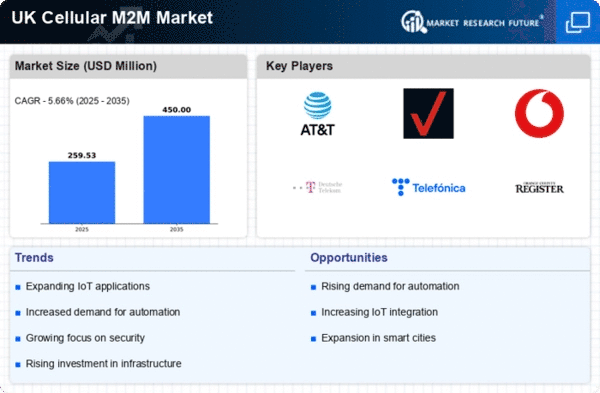Expansion of Smart City Initiatives
The push towards smart city initiatives in the UK is significantly influencing the cellular m2m market. Local governments are investing in infrastructure that supports smart technologies, such as intelligent traffic management systems and waste management solutions. These initiatives aim to improve urban living conditions and enhance resource management. According to recent estimates, the smart city market in the UK is expected to reach £28 billion by 2025, with a substantial portion of this investment directed towards cellular m2m applications. This expansion not only fosters innovation but also creates a conducive environment for the growth of cellular m2m technologies, as they are integral to the functioning of smart city solutions.
Rising Demand for Remote Monitoring
The cellular m2m market is experiencing a notable surge in demand for remote monitoring solutions across various sectors, including healthcare, agriculture, and transportation. This trend is driven by the need for real-time data collection and analysis, which enhances operational efficiency and decision-making. For instance, the healthcare sector is increasingly adopting remote patient monitoring systems, which are projected to grow at a CAGR of 25% over the next five years. This growth is indicative of a broader shift towards digital health solutions, which rely heavily on cellular m2m technologies. As businesses seek to optimize their operations and reduce costs, the cellular M2M market stands to benefit from this rising demand for remote monitoring capabilities..
Advancements in Machine Learning and AI
The integration of machine learning and artificial intelligence (AI) into cellular m2m applications is emerging as a key driver for market growth. These technologies enable more sophisticated data analysis and predictive capabilities, allowing businesses to make informed decisions based on real-time data. The cellular m2m market is likely to benefit from this trend, as companies seek to harness the power of AI to enhance their operational processes. For instance, predictive maintenance solutions powered by AI can reduce downtime by up to 30%, thereby improving overall productivity. As the capabilities of machine learning and AI continue to evolve, their impact on the cellular m2m market is expected to be profound.
Increased Focus on Supply Chain Optimization
The cellular m2m market is witnessing a heightened focus on supply chain optimization, particularly in the logistics and manufacturing sectors. Companies are increasingly leveraging cellular m2m technologies to enhance visibility and control over their supply chains. This trend is driven by the need for real-time tracking of goods and assets, which can lead to improved efficiency and reduced operational costs. Recent data suggests that businesses utilizing cellular m2m solutions for supply chain management can achieve cost savings of up to 15%. As organizations strive to remain competitive in a rapidly evolving market, the demand for cellular m2m solutions in supply chain optimization is likely to grow.
Regulatory Support for Digital Transformation
The UK government is actively promoting digital transformation across various industries, which is positively impacting the cellular m2m market. Regulatory frameworks are being established to facilitate the adoption of advanced technologies, including cellular m2m solutions. Initiatives aimed at enhancing connectivity and digital infrastructure are likely to create a more favorable environment for market growth. For example, the UK government has set ambitious targets for broadband coverage, which is essential for the effective deployment of cellular m2m technologies. As regulatory support continues to strengthen, the cellular m2m market is expected to experience accelerated growth, driven by increased investment and innovation.
















